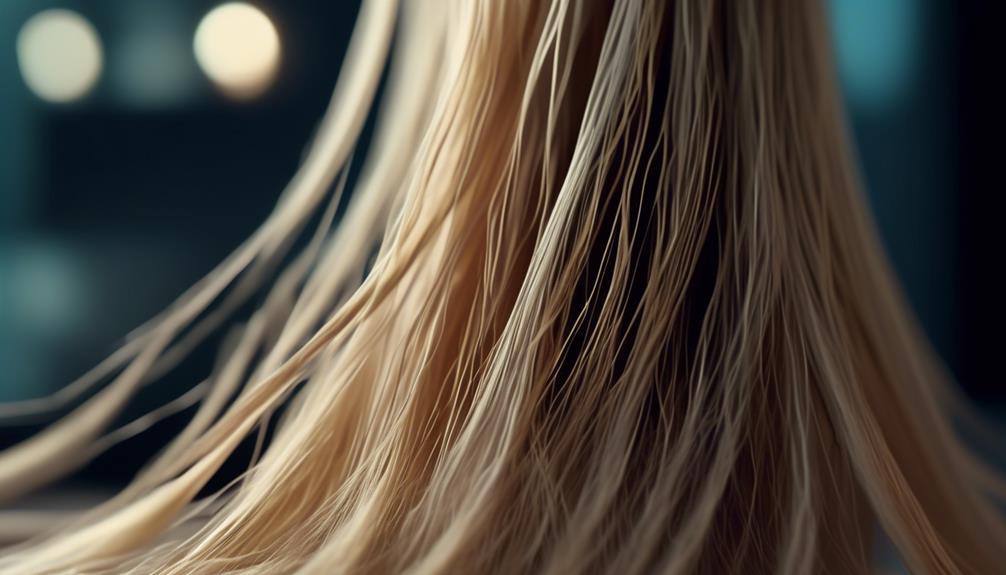The weight of human hair, often overlooked, is a fascinating topic that intertwines with various aspects of biology, physics, and even cultural anthropology. Hair, a seemingly simple strand of keratin, carries intriguing complexities in its weight, which is influenced by numerous factors such as its length, thickness, humidity, and the individual's ethnic background. As we embark on this scientific exploration, we will aim to uncover the intricacies of hair weight, understand the factors that contribute to its variability, and debunk common misconceptions. This knowledge will not only satisfy our intellectual curiosity but also potentially provide insights into the broader contexts of human health and beauty.
Key Takeaways
- Hair weight is influenced by factors such as genetics, hair color, and nutritional intake.
- Longer hair strands weigh more due to increased volume.
- Thicker hair strands contribute more to the overall weight of hair and are associated with better hair health.
- Hair weight can vary across different ethnicities, with Asians generally having denser hair and African hair having similar weight despite its coiled structure.
Understanding Hair Anatomy

To comprehend the weight of hair, it is essential to first delve into the complex anatomy of hair, a subject which encompasses the study of its structure, growth patterns, and compositional elements. Hair, primarily made of a protein named keratin, grows from follicles located in the dermis, or the second layer of the skin. A crucial aspect of understanding hair anatomy involves recognizing the role of sebaceous glands. These glands secrete an oily substance, sebum, which contributes to the luster of hair and overall scalp health.
Hair anatomy also includes the study of hair coloration, a characteristic controlled by the type and concentration of two pigments, eumelanin, and pheomelanin. Eumelanin renders hair shades of brown and black, while pheomelanin gives hair its blonde and red hues. The interplay of these pigments, in concert with genetic factors, results in the diverse spectrum of human hair colors.
Scalp health is fundamentally connected to the state of hair, thus, its importance cannot be overstated. Healthy scalps foster robust hair growth, while conditions like dandruff and dermatitis can lead to hair loss. Ensuring optimal scalp health involves the maintenance of a balanced pH level, regular cleansing to prevent the build-up of dead skin cells, and a nutrient-rich diet.
In essence, to grasp the weight of hair, one must first familiarize themselves with its intricate structure, growth mechanisms, and the factors influencing its color. Additionally, the health of the scalp plays a pivotal role in hair growth and, subsequently, its weight. Thus, innovative approaches to hair care must prioritize these fundamental aspects.
The Weight of Individual Hair Strands
Delving into the minute details, each individual strand of hair, despite its seemingly insubstantial nature, carries a minute but measurable weight. The weight of a single hair strand is approximately 0.62 milligrams, a fact that may seem insignificant on its own but becomes substantial when considered within the context of the average 100,000 to 150,000 hair strands on a human head.
Intriguingly, the weight of an individual hair strand is influenced by various factors, one of which is hair color. The pigmentation of the hair, which determines its color, can impact its weight. Melanin, the pigment responsible for hair color, has a specific gravity that varies between different types. Eumelanin, which imparts a brown or black color, and pheomelanin, responsible for yellow and red hues, have different densities, thus affecting the weight of individual hair strands.
Furthermore, haircare routine's impact on the weight of hair strands should not be overlooked. Products used for hair care, such as conditioners, oils, or styling products, can add to the weight of the hair. These products, designed to improve the appearance, texture, and health of hair, often contain molecules that adhere to the hair shaft, increasing its mass.
However, this increase in hair weight due to haircare products is usually temporary. Washing the hair effectively removes these added molecules, returning the hair to its original weight. This dynamic nature of hair weight underscores the complexity of the hair ecosystem, where even the most minute details can have significant implications. This understanding further paves the way for innovation in hair care science and technology.
Factors Influencing Hair Weight

Several factors, ranging from biological to environmental, significantly influence the overall weight of human hair. These elements interact in complex ways, shaping the density, texture, and thus the weight of our hair, and the understanding of these factors is crucial for those seeking to innovate in the hair care industry.
- Genetics: Genetics plays a fundamental role in determining hair characteristics, including its weight. Each individual's genetic makeup dictates the thickness, color, and density of their hair, all factors that directly affect the hair's weight.
- Hair Color Impact: The pigmentation of hair, dictated by the type and amount of melanin present, also affects its weight. Dark hair typically has more melanin, which can add to its weight compared to lighter hair.
- Nutritional Effects: Nutrient intake significantly impacts hair health and thus its weight. Poor nutrition can lead to thinner, brittle hair, while a balanced diet rich in proteins and vitamins can promote thicker, healthier, and heavier hair.
- Environmental Factors: External factors such as climate, exposure to sunlight, and pollution can alter hair characteristics. For instance, prolonged exposure to sunlight can lighten hair, reducing melanin and potentially decreasing its weight.
Hair Length and Its Impact on Weight
Undeniably, the length of one's hair directly contributes to its overall weight, with longer strands inherently weighing more due to the increased volume of hair fibers. This is a simple concept in physics where mass is directly proportional to volume. An increase in volume, in this case, length and density of hair fibers, results in an increase in mass, hence weight.
However, it is essential to note that hair weight isn't solely dependent on length. The impact of hair color on weight is an intriguing aspect of this discussion. Darker hair colors are typically denser due to higher melanin concentration, thus slightly heavier than lighter hair colors.
Furthermore, the dietary influence on hair weight is a relatively unexplored field. Nutritional intake significantly affects hair health, growth, and subsequently its weight. An adequate diet rich in proteins, vitamins, and minerals promotes the growth of thicker, longer strands, which potentially increases hair weight.
The interplay between hair length, color, and diet underscores the holistic approach required to appreciate the factors influencing hair weight. Understanding these factors may pave the way for innovative methods in hair care, focusing not just on appearance, but also on the health and physical properties of hair.
The Role of Hair Thickness

While hair length, color, and dietary influences are significant, the thickness of individual hair strands also plays a crucial role in determining the overall weight of hair. The thicker the strand, the more it contributes to the total weight, making hair thickness a vital factor in the overall weight equation.
Thickness measurement methods are varied, but all aim to provide an accurate representation of the strand's diameter. One popular method employs micrometers, a tool which measures small, precise distances. Another method includes ultrasound techniques, a non-invasive approach that captures cross-sectional images of individual hair fibers.
The thickness of hair strands not only affects weight but also has a considerable impact on hair health. Thicker strands often signify healthy hair, as they are less prone to breakage and damage. On the other hand, thin strands typically indicate potential hair health issues, including malnutrition, stress, or hormonal imbalances.
To evoke emotion in the audience, consider the following:
- The awe-inspiring precision of modern thickness measurement methods, an epitome of scientific innovation.
- The correlation between hair thickness and health, which underscores the need for a balanced diet and stress management.
- The potential to improve hair health and subsequently hair thickness with proper nutrition and care.
- The fascination of understanding how something as seemingly simple as hair thickness can significantly impact the overall weight of hair.
Understanding the role of hair thickness is a testament to the complexity of hair science, a field that continues to innovate and evolve.
Differences in Hair Weights Across Ethnicities
In exploring the intriguing variations in hair weight, it becomes evident that ethnicity plays a significant role, with distinct differences observed across various ethnic groups. Research has shown that these variances often lead to the necessity of ethnicity-based haircare, as the weight of hair contributes to its overall health, texture, and styling needs.
A commonly held hair weight stereotype is that individuals of Asian descent possess the heaviest hair, primarily due to the typically larger diameter of individual hair strands. Conversely, African hair, with its unique coiled structure, is often perceived as lighter. However, these stereotypes often fail to consider other factors such as hair density and length, which significantly influence hair weight.
Scientific studies have been conducted to quantify these differences. They reveal that, on average, individuals of Asian descent do tend to have denser hair, contributing to a higher weight. However, the curly nature of African hair can create a perception of volume without necessarily adding weight, thus debunking the stereotype of lighter hair. Caucasian hair displays a wide range due to a diverse range of hair types within this ethnicity.
These findings demonstrate the need for customized, ethnicity-based haircare solutions that address the unique needs arising from these weight differences. Product developers and haircare professionals must apply these insights to formulate innovative, effective strategies, fostering healthier hair across all ethnicities.
Myths and Misconceptions About Hair Weight

There exists a plethora of myths and misconceptions surrounding the weight of hair, often leading to misinformation and misunderstanding. To ensure accuracy and dispel fallacies, it is crucial to scrutinize these misconceptions through scientific examination. The ensuing dialogue will address and clarify these prevalent misunderstandings, thereby fostering a more comprehensive and accurate understanding of hair weight.
Debunking Hair Weight Myths
Numerous misconceptions and myths circulate about the weight of hair, often leading to skewed perceptions and misunderstanding. In the interest of debunking hair weight misconceptions, we present a factual examination of these prevalent myths.
- Myth 1: Longer hair significantly increases body weight. Reality: Hair is incredibly lightweight, with 100,000 strands weighing only around 100g.
- Myth 2: Different hair types have drastically different weights. Reality: While thickness and curl pattern can marginally affect weight, the differences are minimal.
- Myth 3: Regular trimming reduces hair weight. Reality: Trimming affects length and health, not weight.
- Myth 4: Hair products considerably add to hair weight. Reality: Products may temporarily increase weight, but not significantly.
Clarifying Hair Weight Misconceptions
To further clarify misconceptions regarding hair weight, we delve into a detailed examination of prevalent myths and their corresponding realities. A common fallacy is that hair weight dramatically alters due to styling effects. In reality, styling products may slightly alter hair's weight temporarily, but not significantly. Another widespread misconception is that the weight of hair directly influences hair health impact. Scientifically, the weight of hair has no substantial bearing on its health, but rather it's the scalp and follicle health that are key determinants. Innovation in trichology reveals that proper nutrition, hydration, and appropriate care routines are essential to maintaining hair health, irrespective of its weight. Therefore, it is crucial to separate fact from fiction to understand hair weight accurately.
Frequently Asked Questions
Can Hair Weight Change Due to Diet or Lifestyle Changes?
Yes, hair weight fluctuations can occur due to diet or lifestyle changes. Nutrient impact on hair growth and density is significant. A diet rich in proteins, vitamins, and minerals can lead to healthier, denser hair, consequently increasing its weight. Conversely, malnutrition or unhealthy lifestyle practices can weaken hair, causing it to thin or fall out, thereby reducing its weight. Therefore, diet and lifestyle changes can indeed affect hair weight.
How Does Hair Weight Affect the Overall Body Weight?
Hair weight, while seemingly insignificant, can impact overall body weight subtly. Hair Weight Variations are typically minimal and influenced by factors such as length, thickness, and density. Seasonal Hair Weight Changes can also occur, albeit marginally, due to factors like humidity and temperature. However, the influence of hair weight on total body weight is negligibly small, and thus, not a significant factor in weight management or health considerations.
Does the Weight of Hair Change With Age?
The weight of hair can indeed change with age due to factors such as Hair Density Variations and Hormonal Influence. As individuals age, hormones that stimulate hair growth may decrease, leading to thinner hair and thus, less weight. Additionally, hair density can vary throughout a person's life, affecting its overall weight. Therefore, it's important to note that changes in hair weight over time are a natural part of the aging process.
Can Certain Hair Treatments or Products Affect the Weight of the Hair?
Certain hair treatments and products can indeed impact the hair density, thus affecting its weight. However, this is often a temporary effect, as the weight of hair largely depends on its length, thickness, and overall health. Some weighty hair myths suggest that products can permanently alter hair's weight, but these claims lack scientific backing. In reality, maintaining optimal hair health and managing its density effectively are key to controlling hair weight.
Can Hair Loss Treatments, Such as Minoxidil or Finasteride, Affect Hair Weight?
Hair loss treatments like minoxidil and finasteride can indeed impact hair weight. Minoxidil absorption into the scalp can stimulate hair growth, thus potentially increasing hair weight. Finasteride, on the other hand, may cause side effects such as thinning of hair, which could reduce hair weight. However, these effects vary among individuals due to factors such as dosage, duration of use, and individual response to treatment.
Conclusion
In conclusion, the weight of hair is a multifaceted matter, influenced by a multitude of elements such as length, thickness, and ethnicity. Though often overlooked, it is as crucial as the cosmos in the grand scheme of haircare. Dispelling myths and misconceptions, a thorough understanding of hair weight can lead to more effective hair care routines, proving once again that even the tiniest details can hold a universe of significance.

